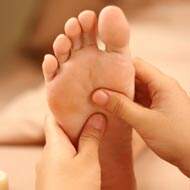Acupressure: What Should You Eat?
Related Blogs
Related Topics
Yoga Questions
Continued...
What's an acupressure diet?
Below are some of the foods and considerations for promoting well-balanced qi or life force.
- In the concept of Qi, food plays a very important role, not just as a source of nourishment but as a source of life.
It is very important to eat three meals a day and to feel full and satiated. - Steamed and boiled foods are recommended to other methods of cooking. Steaming food is preferred because steamed vegetables are tastier and require less seasoning with salt.
- In this type of diet, certain foods such as sugars and fats are not to be combined. This is because when you consume sugar, the body increases insulin production, which promotes fat accumulation. Foods such as toasted bread with butter and jam and drinking juice while eating meals need to be avoided to avoid accumulation of fat.
- The foods that are recommended to maintain the flow of Qi are boiled or steamed vegetables, lean protein, as well as boiled rice. According to the Chinese, rice makes one feel full and is a much healthier source of carbohydrate than bread or noodles.
- Warm foods are a recommended part of this diet.
- Easy to digest foods too are recommended as they help the spleen work well. According to traditional Chinese medicine, the spleen is the organ that helps a person regulate appetite and weight. Any imbalances in the spleen will result in problems with weight and appetite.
- Foods seasoned with the heat from natural spices such ginger, cinnamon, and chili helps the spleen to function better, reducing food cravings and fat accumulation.
References
Read more articles from the General Discussion Category.

Article Categories
 Find Pose
Find Pose

